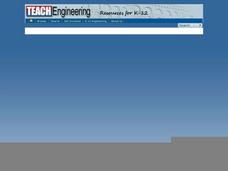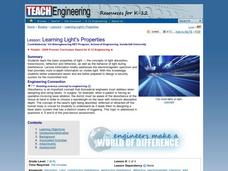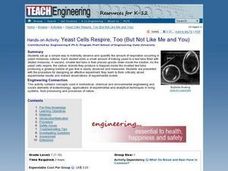Teach Engineering
Light Intensity Lab
Let there be light. The last installment of a seven-part series has pupils conduct an experiment on light attenuation through different numbers of transparency sheets. They then relate the results back to how X-rays measure bone density.
Teach Engineering
A Shot Under Pressure
You've got to pump it up! Using the equations for projectile motion and Bernoulli's Principle, class members calculate the water pressure in a water gun. The pupils collect data on the number of pumps and distance traveled in order to...
Teach Engineering
Flame Test: Red, Green, Blue, Violet?
Let the true colors shine through. Pupils conduct a flame test to identify an unknown element. Class members calculate and prepare specific molarity solutions of three chemicals. Using their observations of the colors emitted, they...
Teach Engineering
How Antibiotics Work
Take two pills and call me in the morning. The first lesson in a short unit of four introduces class members to delivery methods of medicines. The instruction introduces the question of which delivery method is best to get you feeling...
Teach Engineering
Bone Mineral Density Math and Beer's Law
Hop into a resource on Beer's Law. A PowerPoint presentation introduces Beer's law as part of calculating bone density from X-ray images in the sixth instructional activity in the series of seven. Individuals work on practice problems...
Teach Engineering
May the Magnetic Force Be with You
Class members use mathematics in order to better understand magnetic forces and their interaction on charged particles. After a demonstration of the interaction between a magnet and an electron beam using a CRT computer monitor, learners...
Rice University
Intermediate Algebra
Algebra concepts are all wrapped up in one nice bow. The resource combines all the concepts typically found in Algebra I and Algebra II courses in one eBook. The topics covered begin with solving linear equations and move to linear...
Curated OER
Detecting Breast Cancer
Students develop a painless means for identifying cancerous tumors. In this imaging lesson students list the information that may be needed to answer the problem.
Curated OER
The Strongest Pump of All
Students examine how the heart functions and the concept of how electrical currents can affect muscle contractions. In this cardiovascular lesson students identify P, QRS and T complexes.
Curated OER
Protecting the Mummified Troll
Learners develop an invisible security system to protect a mummified troll. In this security system lesson students view a portion of Mythbusters and begin their challenge.
Curated OER
Learning Light's Properties
Students examine the properties of light and the behavior of light during interference. In this electromagnetics lesson students explain behaviors of light.
Curated OER
Types of Scientists
In this science worksheet, students match each type of scientist listed in the left-had column to its correct description found in the right-hand column. There are 34 different scientists to match on the sheet.
Teach Engineering
Properties of Mixtures vs. Solutions: Mix It Up!
Now it becomes crystal clear why the unit is called Mixtures and Solutions. The fifth installment of a six-part unit explores mixtures and solutions. After viewing a demonstration on mixing pebbles with water, salt with water, and...
Teach Engineering
Alloy Advantage
Mix it up by using an intriguing resource that teaches young metallurgists that alloys are a metal mixture. They learn about the advantages of using alloys over pure metals and investigate titanium alloys as an example to finish the...
Curated OER
Silly Semi-Solids
Students create a polymer out of glue, water, and borax. They discuss the resulting substance and perform several experiments with it.
Teach Engineering
Kidney Stone Crystallization
No one likes kidney stones, but they are very interesting to learn about. The last installment of a three-part unit has learners experiment with different chemicals to see which one inhibits the growth of calcium oxalate crystals (which...
Curated OER
Our Amazing Skeleton
Young scholars study the skeleton, about the number of and types of bones in the body, and how outer space affects astronauts' bones. They discover how to take care of their bones here on Earth to prevent osteoporosis, or, weakening of...
Curated OER
Endocrine Excitement!
Students are divided into a group of hormones and a group of receptors. The hormones have to find their matching receptors, and the pair, once matched, perform a given action. This activity helps students examine the specificity of...
Curated OER
Biomechanics of Joints
Learners investigate range of motion in human joints and the mechanical devices they emulate. They construct a human arm model with three joints which emulate the wrist, elbow and shoulder.
Curated OER
Seeing the World Through A Different Lens
Middle schoolers participate in activities in which they model different disabilities. They discuss their experiences as a class. They work together in groups to discuss how to improve an adaptive device.
Curated OER
Biomechanics of Joints
Young scholars examine the range of motion of your knee, wrist and shoulder and observe that these body parts act like different types of mechanical joints.
Curated OER
TE Activity: Yeast Cells Respire, Too (But Not Like Me and You)
Student observe and quantify the respiration that occurs in yeast-molasses cultures. They complete an effective experiment in order to examine how to think critically about the results.
Curated OER
Super Scientists Bingo
In this science worksheet, students select twenty-five scientists from the list to fill in their bingo card. Then they match each of the scientists listed to their correct description strip.

























